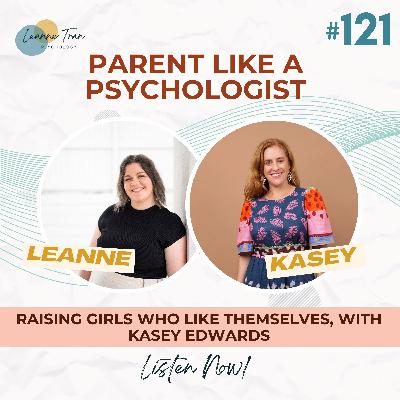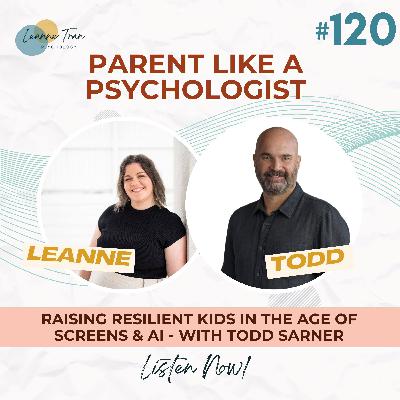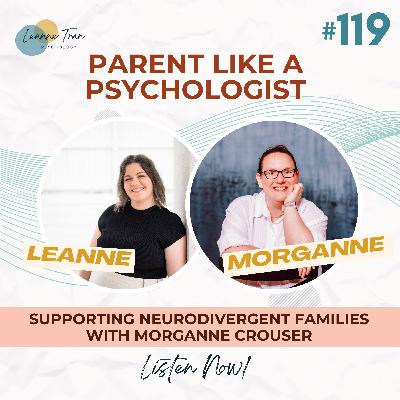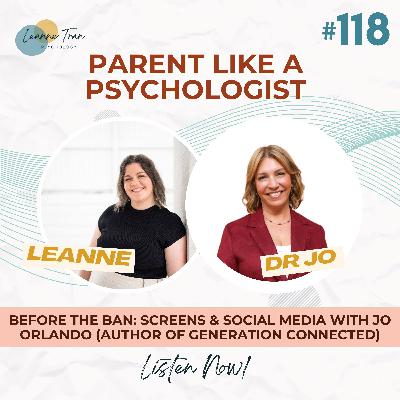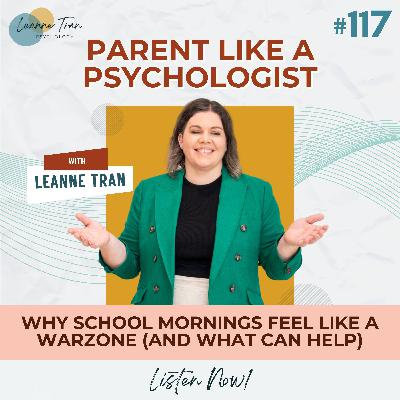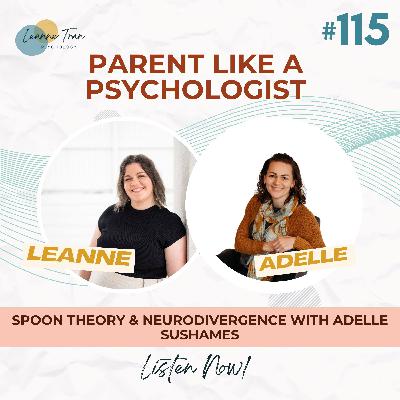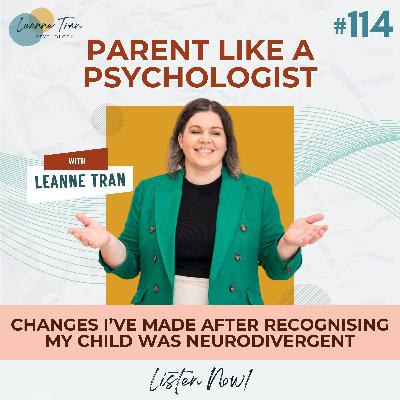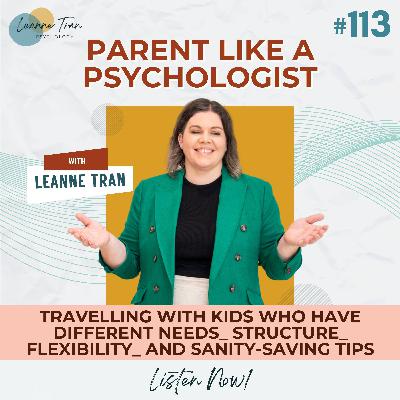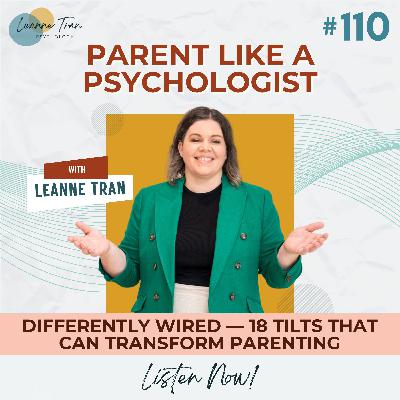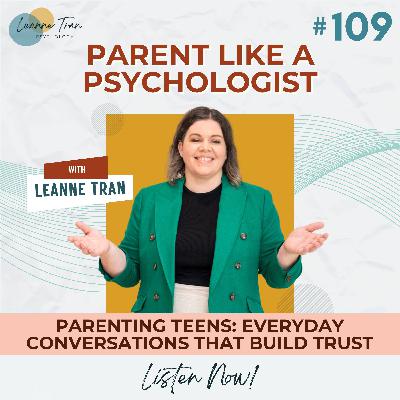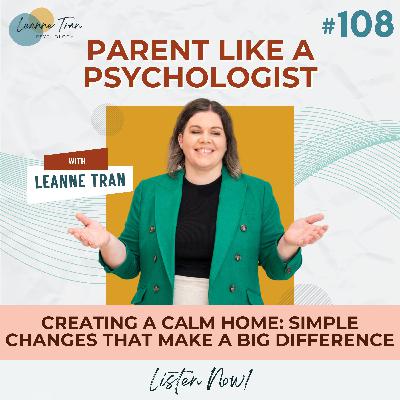Discover Parent Like A Psychologist
Parent Like A Psychologist

Parent Like A Psychologist
Author: Leanne Tran
Subscribed: 8Played: 68Subscribe
Share
Description
When your children don’t fit the mould, it can cause a lot of friction unless the adults in their lives can be flexible. This podcast is all about moulding ourselves to what our kids need to forge an easier, calmer path in parenting. Moulding your parenting and expectations. Moulding your child’s environment and skills. I’ve got the evidence based strategies, but parents are the change makers – so let’s do this together. Come on in!
128 Episodes
Reverse
Many parents quietly believe that needing help means they’re failing.
In this episode of Parent Like a Psychologist, I gently challenge that idea and offer a much healthier reframe: getting support isn’t giving up – it’s showing up for yourself and your child.
If you’ve ever felt guilty for asking for help, struggled to do everything on your own, or worried that seeking support means you “should be coping better,” this episode is for you.
In This Episode, We Talk About:
Why so many parents believe they should cope alone
How modern parenting has moved away from shared support and community
Why strong parents don’t do it all by themselves
How getting support improves your child’s wellbeing, not just your own
Why support isn’t about fixing your child – it’s about strengthening the whole family
A powerful mindset shift that can reduce stress and increase confidence
This episode is especially relevant for parents of neurodivergent children or kids who seem to need more support than others. Parenting is harder when you feel isolated, and it becomes much more manageable when you feel understood and guided.
A Gentle Question to Reflect On
What would change for you if you saw getting support as a strength, not a failure?
This episode isn’t about strategies or tools. It’s about changing how you think about support – and how that shift alone can bring more calm and confidence into your family.
You Were Never Meant to Do This Alone
Parenting was never meant to be a solo effort. Getting support doesn’t mean you’re doing something wrong. It means you care deeply about doing things well – and sustainably.
🎧 Listen to the episode now and take a breath. You don’t have to carry everything on your own.
👉 Want more support? Explore my parent programs and resources designed to help you feel calmer, clearer, and more confident in your parenting. When parents feel supported, kids do better too.
You’re allowed to get help. And when you’re ready, I’m here.
Follow me on:
Instagram:@leannetranpsychologyFacebook: @Leanne TranLinked In: @leannetranpsychologyEmail me: hello@leannetran.com.auVisit my website: learn.leannetran.com.au
In this episode of Parent Like a Psychologist, we explore a powerful idea every parent needs to understand: behaviour is communication.
When children don’t yet have the words or skills to explain how they’re feeling, they use behaviour to send the message for them. And just like adults, when that message isn’t heard, it doesn’t disappear, it gets louder.
We talk about:
Why big, challenging behaviour is often a sign of unmet needs, not bad behaviour
How emotional overwhelm, lack of control, or difficulty with regulation can show up as rudeness, meltdowns, or defiance
Why ignoring behaviour often leads to escalation
How shifting from “How do I stop this?” to “What is my child trying to tell me?” can change everything
What listening to behaviour actually looks like in everyday parenting
This episode is especially helpful for parents of children with ADHD, autism, anxiety, or emotional regulation difficulties, but the message applies to all kids.
When children feel understood and supported, behaviour often softens. Connection grows. Stress reduces. And parenting starts to feel more manageable.
🎧 Listen now if you want to understand your child’s behaviour with more clarity and compassion.
👉 Need more support? If you’d like help working out what your child’s behaviour is communicating, and how to respond with less stress and more confidence, I’d love to help. Explore my parent programs or get in touch to find the right next step for your family.
You don’t have to do this alone.
Follow me on:
Instagram:@leannetranpsychologyFacebook: @Leanne TranLinked In: @leannetranpsychologyEmail me: hello@leannetran.com.auVisit my website: learn.leannetran.com.au
Many parents tell me they’re waiting.
Waiting for things to settle. Waiting for their child to grow out of it. Waiting for the “right time” to get support.
In this episode of Parent Like a Psychologist, we talk about what actually happens when a child’s emotional, behavioural, or developmental needs go unmet, and why waiting often makes things harder, not easier.
When kids’ needs aren’t met, problems don’t stay the same
One of the biggest misunderstandings parents have is thinking challenges will pause while they wait. They don’t.
Unmet needs tend to snowball.
A child who struggles with emotional regulation when they’re young might start with tantrums or meltdowns. Over time, those same unmet needs can show up as:
Bigger emotional outbursts
Anxiety or chronic stress
Friendship difficulties
Learning disruptions at school
School refusal or avoidance
What starts as one challenge often turns into two or three, not because parents have done anything wrong, but because the original need was never fully supported.
Why early support matters
Getting help early isn’t about panic or overreacting. It’s about prevention.
When parents understand what their child needs and how to meet those needs, they can:
Reduce stress and anxiety before it escalates
Build emotional regulation skills earlier
Protect learning, friendships, and confidence
Lower their own stress and emotional load
Early support often stops small struggles from becoming much bigger ones.
Getting help is not a failure
Many parents worry they’ll be judged, told they’re imagining things, or that they’re wasting a professional’s time.
That simply isn’t true.
Seeking support is thoughtful, protective, and a sign of a deeply engaged parent. It’s also about easing your load before things feel overwhelming.
A question to reflect on
Ask yourself:
Have the challenges stayed the same, or changed over time?
Are they showing up in new or more complex ways?
Is waiting making things feel heavier for you?
Challenges don’t pause while we wait. They usually reshape themselves.
Ready to take the next step?
If you’ve been hoping things will improve on their own, or you want to stop challenges from snowballing, this is your sign to reach out.
My programs are available anytime, so you can start when you’re ready. You don’t have to do this alone.
👉 Listen to the episode now 👉 Explore my parent programs for practical, supportive guidance
Early support is not dramatic. It’s calm, protective, and powerful.
Follow me on:
Instagram:@leannetranpsychologyFacebook: @Leanne TranLinked In: @leannetranpsychologyEmail me: hello@leannetran.com.auVisit my website: learn.leannetran.com.au
Have you ever had a small, uncomfortable feeling that something isn’t quite right for your child – and then immediately talked yourself out of it?
In this episode, I talk about that quiet gut feeling many parents have and why it matters. The one that whispers “something’s off” even when others say, “They’ll grow out of it” or *“You’re overthinking it.”
Drawing on my work as a psychologist, I unpack why parental intuition is information, not overreaction. We explore why it’s so easy to dismiss our concerns, how this can delay support, and why listening earlier can actually reduce stress for both you and your child.
This episode is especially helpful if you’re wondering:
Whether your child’s struggles are “normal” or need support
If you’re overreacting or actually picking up on something important
When the right time is to ask for help
Why that uneasy feeling keeps coming back
You’ll also be guided through gentle reflection questions to help you tune into what your gut may be trying to tell you – about your child and about what you need as a parent.
If you’ve been thinking, “Do I need help?”, that question alone might already be your answer.
🎧 Listen now and give yourself permission to trust what you already know. If this episode stirs something for you, explore support early. Small, gentle steps can make a big difference.
Follow me on:
Instagram:@leannetranpsychologyFacebook: @Leanne TranLinked In: @leannetranpsychologyEmail me: hello@leannetran.com.auVisit my website: learn.leannetran.com.au
When your child seems to be “acting out just for attention,” it can feel frustrating, personal, and endless. In this episode of Parent Like a Psychologist, I’m joined by US psychologist Dr Larry Waldman to unpack what’s really going on underneath “attention-seeking” behaviour – and how parents can respond in a calmer, more effective way.
Drawing on decades of work with children, teens, and families, Dr Waldman explains the behavioural approach to parenting in simple, practical terms. We talk about why kids quickly learn that certain behaviours get a big reaction, how a negative attention cycle develops at home, and why parental time and attention are the most powerful “currency” children have.
Instead of focusing on punishment or “making kids learn a lesson,” we explore how to:
Use your attention as a positive reward for the behaviour you want to see
Break the pattern where kids only get noticed when things go wrong
“Catch them while they’re good” and build more cooperation over time
Balance ignoring minor misbehaviour with noticing and praising positive choices
Apply these ideas not just with kids, but also at work and in relationships
If you’ve ever heard yourself say, “They’re doing it just for attention,” this episode will help you see that attention differently – and use it in a way that strengthens behaviour and your relationship with your child.
Follow me on:
Instagram:@leannetranpsychologyFacebook: @Leanne TranLinked In: @leannetranpsychologyEmail me: hello@leannetran.com.auVisit my website: learn.leannetran.com.au
What does it really take for a girl to grow up liking herself in a world that constantly tells her she’s not enough?
In this episode of Parent Like a Psychologist, I sit down with bestselling author and researcher Kasey Edwards to unpack the key ideas behind her book Raising Girls Who Like Themselves. Kasey and her husband, Dr Christopher Scanlon, spent 10 years investigating what helps girls develop genuine confidence, strong self-worth, and a clear sense of who they are.
Together, we explore the seven foundations that help girls feel strong and secure:
• Body ownership & body safety
How everyday rules about clothing, affection, and appearance shape a girl’s belief about who her body belongs to, and how body autonomy protects her throughout her life.
• Confidence built on mastery
Why stepping back, letting kids try hard things, and allowing them to fail is essential for resilience and true self-esteem.
• Moving beyond beauty-focused praise
Girls hear more appearance-based comments than anything else. Kasey explains the hidden harm behind this, and what to focus on instead to build inner strength.
• The “power perspective”
A simple shift that teaches girls to value their own opinions over external approval, including Kasey’s brilliant “flipping praise” strategy.
• Teaching girls to ask, not hint
How socialisation teaches girls to wish, hint, and wait, and how to help them ask directly for what they want.
• Independence, responsibility & speaking for themselves
The small daily interactions that shape a girl’s confidence at school, socially, and with adults.
• Raising a girl who is truly herself
Kasey shares the idea of “seed parenting vs stone parenting,” and how nurturing who our kids naturally are helps them thrive.
This is a warm, honest, and deeply practical conversation for any parent raising daughters in today’s world.
Listen now
If you’re raising a girl, or you simply want to better understand how to support the girls in your life, this episode is a must-listen.
Want more support?
If you’re looking for practical tools to feel calmer and more confident in your parenting, explore my parent programs here:
👉 Parent Courses Available Now, start anytime, no waitlist (Link Here)
Follow me on:
Instagram:@leannetranpsychologyFacebook: @Leanne TranLinked In: @leannetranpsychologyEmail me: hello@leannetran.com.auVisit my website: learn.leannetran.com.au
How attachment-first parenting helps kids thrive in the age of screens and AI
In this episode of Parent Like a Psychologist, I sit down with Todd Sarner, parenting coach, marriage therapist, and author of The Calm and Connected Parent: An Attachment-First Guide to Raising Resilient Kids in the Age of Screens and AI.
Todd’s work centres on helping parents lead with calm confidence, strong boundaries, and deep connection. His attachment-based approach is steady, warm, and refreshingly practical, especially for parents of neurodivergent kids.
What we cover in this episode
This conversation goes deep into the heart of modern parenting, and why connection is the foundation for everything else, including behaviour, emotional regulation, sibling dynamics, and screen time.
We explore:
Why “attachment-first parenting” matters more than ever in a world of screens, AI, and constant distraction
The real reason many common parenting approaches fall flat (hello, pendulum swings between “gentle” and “tough love”)
How kids signal their need for connection, even when it looks like resistance, complaining, or pushing you away
Why teenagers often open up only right before bed, and how to use that time wisely
The truth about sibling rivalry and how much of it comes down to a child’s fear of losing your attention
Why one-size-fits-all parenting doesn’t work, and how to read each child’s unique temperament and needs
Simple shifts parents can make to build resilience, cooperation, and trust
How to balance warmth and boundaries without yelling, threatening, or feeling like you’re constantly firefighting
Why this episode matters
Parents today are raising kids in a completely different world, social media, algorithms, AI, academic pressure, and constant stimulation. Todd explains how secure attachment acts like a compass, helping children feel safe, grounded, confident, and better able to manage challenges.
If you’ve ever felt:
torn between being “gentle” and setting firm limits
confused by conflicting parenting advice
frustrated when strategies work for one child but not another
overwhelmed by kids fighting, screen battles, or emotional ups and downs, this episode gives you clarity and direction.
About Todd Sarner
Todd is a parent coach and couples therapist based in the U.S., known for his attachment-based, developmentally aware approach to raising resilient kids. His new book, The Calm and Connected Parent, offers a clear, compassionate roadmap for parenting in the digital age.
Listen now
This is one of those conversations that will leave you feeling seen, supported, and equipped with practical tools you can use right away.
Tune in wherever you get your podcasts, or listen now on Parent Like a Psychologist.
Follow me on:
Instagram:@leannetranpsychologyFacebook: @Leanne TranLinked In: @leannetranpsychologyEmail me: hello@leannetran.com.auVisit my website: learn.leannetran.com.au
In this episode, I sit down with therapist and parent Morganne Crouser, who brings a rare mix of lived experience and clinical insight. Morganne has worked for years with neurodivergent families in the US, providing intensive in-home therapy, supervising clinicians, and consulting with parents who are trying to make sense of new diagnoses. She’s also a parent to three neurodivergent young people-ages 4, 8, and 23-so she truly understands both sides of the story.
Together, we talk about what it really looks like to support kids and parents in a way that’s practical, compassionate, and grounded in how the brain develops.
What Morganne Does - and Why It Matters
Morganne’s work centres around supporting families as a whole, not just the child. She explains in-home family therapy, which involves visiting families multiple times a week and helping everyone move in the same direction.
Her big message: Individual therapy is helpful… but it only works well when the whole family understands the plan and can grow together.
This becomes even more important when a family includes multiple neurotypes or when parents are feeling stressed, overwhelmed, or unsure where to start.
Understanding the ARC Model (Attachment, Regulation, Competency)
Morganne introduces the ARC model, a framework she uses with families-and in her own home:
1. Attachment
Building a strong sense of safety, comfort, and connection. This isn’t about being perfect; it’s about being predictable and emotionally available. Kids need to know: I can trust you. You know me. My world makes sense.
2. Regulation
Before kids can manage big feelings, they need to understand what’s happening inside their bodies and minds. Morganne reminds us that adults need this too. Sensory tools, deep breaths, stepping away for a moment-these help parents just as much as kids.
3. Competency
This is where skills grow-problem-solving, independence, executive functioning. But Morganne is clear: Kids can’t build skills if they’re dysregulated or don’t feel safe.
Trying to teach “competency” without the first two levels is like building a second storey before the walls are up.
Why Parents’ Regulation Matters Just As Much
One of my favourite parts of our conversation is when Morganne talks about parents using the same tools they teach their kids.
If your child is learning:
deep breaths
sensory breaks
body socks or weighted blankets
naming feelings
stepping away to calm down
…then those same strategies can help you too.
Kids learn best when they can see regulation in action, not just hear it explained. As Morganne says, it also helps children feel less “different” when they see the grown-ups using the same supports.
The Real Life Side of Parenting Neurodivergent Kids
Morganne shares openly about becoming a foster parent to an 8-year-old and a 1-year-old with little notice-and how overwhelming that first week was. Even as an experienced therapist, she felt lost.
Her message is one all parents need to hear: Being a professional doesn’t make parenting magically easy. When emotions, exhaustion, and real-life pressure show up, it’s normal to struggle.
This honesty is one of the things that makes this conversation so reassuring.
What Happens as Kids Grow?
We also talk about how ARC isn’t linear. You don’t “finish” attachment or regulation and move on. Kids grow, life changes, and parents need to revisit these layers again and again.
Toddlers need different responses than teens.
Parents’ needs shift when life throws curveballs.
Some stages require us to circle back to basics.
And that’s normal.
If You’re Parenting a Neurodivergent Child…
This episode will leave you feeling seen, understood, and more confident about what your child and your family system might need.
You’ll walk away with:
a clearer understanding of why safety and connection come first
simple ways to support emotional regulation in kids and adults
a helpful framework for thinking about development over time
permission to be human, not perfect
reassurance that you don’t have to “fix everything” at once
Listen Now
This is a warm, real, and practical chat that I know so many parents will find helpful-especially if you’ve ever wondered, “Where do I even start?”
🎧 Listen to the full episode here: Parent Like a Psychologist with guest Morganne Crouser
Follow me on:
Instagram:@leannetranpsychologyFacebook: @Leanne TranLinked In: @leannetranpsychologyEmail me: hello@leannetran.com.auVisit my website: learn.leannetran.com.au
Parenting in a digital world can feel overwhelming – especially with constant talk of screen time, social media, and bans that seem to change every five minutes. In this episode of Parent Like a Psychologist, I’m joined by Dr Jo Orlando, researcher and author of Generation Connected: How to Parent in a Digital World at Every Age and Stage.
Jo has spent the last 15 years in Australian homes, schools, and communities – from big cities to very remote towns – watching how real families actually use technology. Her work shows that it’s not just the devices or apps themselves that matter, but how we use them, why we use them, and what our kids’ brains are doing at each age and stage.
Together we unpack her framework of the three forces of digital parenting –
Brain development
Tech design
Social context
…and how these three pieces help us move away from “just limit screen time” and towards practical, realistic strategies that protect our kids and our relationship with them.
In this episode, we talk about:
Why blanket advice like “just limit screen time” doesn’t work – and what to focus on instead
The difference between screen time and screen quality, and why 30 minutes isn’t always equal
How tech use looks different at every age, from babies through to older teens
The special role tech can play for neurodivergent kids, including social connection and success online
What to look for in apps, games, and shows that might be overstimulating for younger or sensitive kids
Simple ways to support your child’s transition off screens (and why some kids need a few quiet minutes to “re-enter” the offline world)
How Jo’s three forces framework can help you problem-solve tricky situations – like tracking apps, Fortnite arguments, and social media drama
The impact of our own tech habits as parents, right from baby feeding days through to the teen years
Alternatives to using screens as our only calming/waiting strategy – and how to build more tools into your parenting toolkit
The upcoming social media ban in Australia, why it hits 14–15 year olds hardest, and how to talk with your teen about FOMO, validation, and friendship
Jo also shares powerful real-life stories from Australian families (with names changed), showing that there isn’t one “right” way to parent around tech – there are many paths that can work, once you understand what’s going on underneath.
If you’ve ever worried you’re “doing it wrong” with screens, or felt stuck between fear-based headlines and “she’ll be right,” this episode will help you feel more informed, more confident, and more connected to your child in our digital world.
Follow me on:
Instagram:@leannetranpsychologyFacebook: @Leanne TranLinked In: @leannetranpsychologyEmail me: hello@leannetran.com.auVisit my website: learn.leannetran.com.au
If your school mornings feel like a battle zone — with lost shoes, tears, or tense standoffs at the door — you’re definitely not alone. In this episode of Parent Like a Psychologist, Educational and Developmental Psychologist Leanne Tran unpacks why mornings can be so hard for kids (and parents!) and what you can do to bring more calm and cooperation to the start of your day.
You’ll learn: ✨ Why mornings are especially tough for neurodivergent kids — from anxiety and sensory overload to executive functioning challenges. ✨ How to set up your home and routines to reduce chaos and prevent meltdowns before they start. ✨ Simple, evidence-based strategies like visual schedules, positive reinforcement, and small choices that help kids feel more capable and in control. ✨ When morning struggles are a sign of deeper issues — like anxiety, learning difficulties, or sensory needs — and how to know when it’s time to seek extra support.
Leanne also shares practical examples from her own family and clients, helping you see that these moments aren’t about “bad behavior” — they’re opportunities to teach emotional and practical skills for life.
Because when we understand why our kids are struggling, we can stop reacting and start helping.
🎧 Listen now to learn how to turn your morning battles into connection, confidence, and calm.
➡️ Want more support? Download Leanne’s free Visual Routines Guide to create a calmer morning rhythm at www.leannetran.com.au
Follow me on:
Instagram:@leannetranpsychologyFacebook: @Leanne TranLinked In: @leannetranpsychologyEmail me: hello@leannetran.com.auVisit my website: learn.leannetran.com.au
Does your child burst into tears when dinner looks different, refuse a birthday party invite, or panic at the thought of trying swimming lessons? You’re not alone — and it’s not stubbornness or “bad behaviour.” In this episode, we unpack what’s really going on when kids resist new experiences and how you can support them with compassion and confidence.
Inside this episode, you’ll learn: ✨ The real reason behind inflexibility — why children with autism, ADHD, anxiety, or sensitive temperaments crave sameness and find change so overwhelming. 🧠 The mindset shift parents need to better understand their child’s reactions and reduce conflict. 🧺 Why prevention is 90% of the work when it comes to behaviour — and what to do before tricky moments happen. 🧒 Practical strategies to gently build flexibility, including: • Offering meaningful control and choices • Using visuals, social stories, and play-based exposure • Introducing small, manageable steps that reduce anxiety • Celebrating tiny wins to build confidence 💛 How to respond calmly in the moment — with empathy, coaching, and connection (not pressure) 💬 The exact language to validate your child’s feelings, reduce fear, and encourage resilience 🌱 Why progress — not perfection — is the goal when supporting a child who finds new things hard
If your child struggles with change, unpredictability, anxiety, or big feelings, this episode will help you understand them more deeply and guide them forward with kindness.
You’ll walk away with tools to: ✔ Prevent overwhelm and meltdowns before they happen ✔ Support your child to try new things at their pace ✔ Build their emotional skills, courage, and resilience over time
For parents wanting extra support in teaching these skills at home, I also share how we can work together through Chaos to Calm.
Press play to feel calmer, more confident, and equipped to help your child approach new experiences with courage — one small step at a time.
Follow me on:
Instagram:@leannetranpsychologyFacebook: @Leanne TranLinked In: @leannetranpsychologyEmail me: hello@leannetran.com.auVisit my website: learn.leannetran.com.au
In this episode of Parent Like a Psychologist, Leanne is joined by Adelle Sushames—a late-diagnosed AuDHD clinical psychologist, creator of the NDME and Spoon Theory card decks, and the voice behind Neurodivergent Ally. Together, they explore how neurodivergent children (and adults) can better understand their needs, communicate them, and feel empowered rather than pathologized.
Adelle shares how her card decks help shift the language around autism and ADHD from deficits to preferences, strengths, identity, and lived experience. The conversation dives deep into Spoon Theory, a framework for understanding fluctuating energy levels, why children can appear “fine at school but melt down at home,” and how families and educators can use this language to support kids with compassion instead of pressure.
This episode is warm, insightful, validating—and full of practical tools for supporting neurodivergent children with space and grace.
What We Talk About in This Episode
Why traditional clinical descriptions of autism and ADHD often don’t reflect lived experience
The purpose and philosophy behind the NDME identity-affirming cards
How Spoon Theory helps explain fluctuating capacity and energy levels throughout the day
Why some children can cope at school but collapse emotionally at home
Understanding school-based burnout and school can't
The emotional experience of being neurodivergent in a world not designed for your brain
How cards can open gentle, low-pressure conversations between parents and kids
The importance of self-compassion for both children and parents
The idea of parenting neurodivergent kids with space + grace, rather than endless demands
Guest Bio – Adelle Sushames (Neurodivergent Ally)
Adelle Sushames is a late-diagnosed AuDHD Clinical Psychologist and the creator of several neurodiversity-affirming card decks designed to help autistic and ADHD individuals better understand themselves and communicate their needs. Her NDME, Spoon Thieves, and Spoon Savers card decks are used across therapy, home, school, and community settings.
Adelle is also known online as Neurodivergent Ally, where she shares support, education, and relatable parenting insights—delivered with professional expertise, heart, and her signature sass.
Connect with Adelle
Instagram: @neurodivergent_ally
Facebook: Neurodivergent Ally
Website & Card Decks: https://www.neurodivergentally.com/
Free Children’s Book on Understanding AuDHD: https://www.neurodivergentally.com/freebies
Listener Takeaways
After listening, you’ll walk away with:
✅ A clearer understanding of how neurodivergent brains manage energy ✅ A strength-based language to help kids recognise and express their needs ✅ Tools to reduce after-school meltdowns and emotional overwhelm ✅ Insight into burnout and why “just push through” doesn’t work ✅ Validation that supporting your child means supporting yourself, too
Follow me on:
Instagram:@leannetranpsychologyFacebook: @Leanne TranLinked In: @leannetranpsychologyEmail me: hello@leannetran.com.auVisit my website: learn.leannetran.com.au
When we first recognize that our child is neurodivergent, it can feel like the ground shifts beneath us. Parenting becomes less about “fixing” behaviors and more about reshaping expectations, letting go of old norms, and creating a home environment that truly works for everyone.
In this heartfelt and personal episode of Parent Like a Psychologist, the host reflects on the real and often emotional shifts that come with parenting a neurodivergent child. Rather than focusing on clinical strategies or checklists, this conversation dives into three meaningful changes that transformed daily family life:
Letting Go of the Sit-Down Dinner – Redefining what connection at the table looks like, understanding sensory and movement needs, and lowering pressure for “perfect” family mealtimes.
Rethinking Physical Affection – Honoring a child’s boundaries while finding new, creative ways to stay connected.
Invitations Instead of Instructions – Moving away from rigid demands and toward collaborative, flexible communication that invites cooperation.
Through personal stories and gentle reflections, the episode explores how shifting parental expectations—rather than changing the child—can bring more calm, empathy, and connection into family life.
Listeners will gain:
Practical mindset shifts that ease daily stress
Tips for adapting routines without losing family values
A reminder that letting go of old expectations isn’t “giving up” — it’s making space for a better fit for your family.
Perfect for: Parents of neurodivergent children, caregivers seeking more empathy-based approaches, and anyone ready to parent with greater flexibility and self-compassion.
“Sometimes the biggest change doesn’t come from our kids — it comes from us.”
Follow me on:
Instagram:@leannetranpsychologyFacebook: @Leanne TranLinked In: @leannetranpsychologyEmail me: hello@leannetran.com.auVisit my website: learn.leannetran.com.au
Travelling with kids can feel like an Olympic-level parenting challenge—especially when anxiety, boredom, or a strong need for control enters the mix. In this episode of Parent Like a Psychologist, we unpack practical, evidence-informed strategies to make family trips smoother and more enjoyable.
What You’ll Learn in This Episode:
The power of preparation: How visual schedules and clear communication ease anxiety.
Flexibility within structure: Why alternating “adult” and “kid” days keeps everyone engaged.
Boredom busters: Creative ways to keep kids occupied — from scavenger hunts to card games.
Reducing stress in transit: Simple safety systems and “no problem-solving zones” during high-stress moments.
Kid-centric planning: How giving children choice turns travel into a shared adventure.
Key Takeaways:
Kids cope better when they know what to expect.
Building in choice and familiar activities can turn frustration into fun.
Sandwiching challenging activities with enjoyable ones keeps spirits high.
A little prep time before the trip leads to a lot more joy during it.
Travel is a unique opportunity for growth, connection, and shared memories.
Who This Episode Is For:
Parents of children with anxiety, ADHD, or other neurodivergent needs.
Families who love to travel but want more peace (and fewer meltdowns).
Caregivers looking for realistic, evidence-informed strategies.
Mentioned in This Episode:
Family travel to Athens and the Olympic Stadium
Creative kid-friendly detours like visiting the largest outdoor escalator in Washington, D.C.
Tips for using museum kids’ guides, scavenger hunts, and flexible schedules
Join the Conversation:
Got your own travel hacks for kids with different needs? Share your tips on Instagram at @LeanneTransPsychology or through the website contact form. Listener insights may even feature in an upcoming episode!
Follow me on:
Instagram:@leannetranpsychologyFacebook: @Leanne TranLinked In: @leannetranpsychologyEmail me: hello@leannetran.com.auVisit my website: learn.leannetran.com.au
In this episode of Parent Like a Psychologist, host Leanne Tran sits down with Sandrine Alexandre Hughes — part-time lawyer, mum of three, and creator of the online safety resources See Me Together Online and the card games All the Likes and Smoke, Mirrors & Filters.
Together, they explore how parents can build their children’s digital resilience and online safety awareness through connection, conversation, and play. Sandrine shares how hearing tragic online stories before the pandemic inspired her to create practical, anxiety-free ways for families to discuss e-safety — long before issues arise.
You’ll learn:
Why games are a powerful tool for opening conversations about online behaviour and digital literacy.
How to start early, keep talks age-appropriate, and “chat early, chat often.”
How the card game All the Likes helps children aged 6–12 learn about kindness, privacy, and online boundaries.
How Smoke, Mirrors & Filters sparks reflection and discussion among teens and adults about selfies, filters, and social media habits.
Why e-safety is a shared responsibility between parents, schools, and society — and how connection offline supports wellbeing online.
How families, including those with neurodivergent children, can use play to explore these important topics safely and meaningfully.
Leanne and Sandrine also dive into Australia’s new social media legislation, the mixed responses from families, and what it means for helping kids stay connected in healthier, more mindful ways.
Tune in for an uplifting and practical conversation that reminds us: The best way to protect kids online is to stay connected offline.
Resources Mentioned
Website: teamtogetheronline.com Games: All the Likes (ages 6–12) & Smoke, Mirrors & Filters (ages 15+) Merch: “I’m Your Favorite Notification” caps & mugs
Show Notes
Email: contact@teamtogetheronline.com Instagram: @teamtogetheronline.com Website: www.teamtogetheronline.com
“I am Sandrine, a mother to three kids. I’m French and Australian, and a lawyer by profession — it turns out a lawyer can be a creative entrepreneur too! I started Team Together Online to say goodbye to parental anxiety around online safety and wellbeing. Why a card game? Because what’s better than play to relax, connect, practise skills, and, ultimately, learn?
Team Together Online’s mission has now expanded to help all generations improve their online wellbeing. That’s why I created Smoke, Mirrors + Filters (15+ / Adults) — so you can have fun and deep conversations you never thought you’d have!”
Listener Bonus
Sandrine is offering Parent Like a Psychologist listeners an exclusive 20% discount on All the Likes with the code PARENTING at checkout. Valid for 7 days after the release of this episode (while stocks last).
Shop now at: teamtogetheronline.com
Follow me on:
Instagram:@leannetranpsychologyFacebook: @Leanne TranLinked In: @leannetranpsychologyEmail me: hello@leannetran.com.auVisit my website: learn.leannetran.com.au
In this episode of Parent Like a Psychologist, we dive deep into one of the most overwhelming and confusing challenges parents face: meltdowns. If your child goes from calm to explosive over small things, can’t be reasoned with in the heat of the moment, or leaves the whole family feeling like they’re walking on eggshells—you’re not alone, and you’re not a bad parent.
Together, we explore:
The key difference between tantrums and meltdowns
Why meltdowns happen (and what they’re really communicating)
Common triggers like transitions, unexpected changes, sensory overwhelm, fatigue, hunger, and difficult demands
What not to do during a meltdown (and why reasoning or escalating doesn’t work)
What to do instead—including staying calm, reducing demands, creating safety, and helping your child regulate
How to reconnect and reflect after the storm so your child learns and builds coping skills
You’ll also hear practical strategies, from using the “cup of capacity” analogy to building a calming plan or kit, that can help prevent meltdowns or make them easier to navigate when they do happen.
This episode will leave you feeling reassured, better equipped, and more compassionate—both toward your child and yourself. Remember, meltdowns aren’t a sign of failure. They’re signals. And with the right tools and mindset, you can respond in ways that truly support your child’s emotional needs.
If you’re ready to go deeper, check out the Chaos to Calm program, where we work alongside parents to create personalized strategies for understanding and managing meltdowns.
Follow me on:
Instagram:@leannetranpsychologyFacebook: @Leanne TranLinked In: @leannetranpsychologyEmail me: hello@leannetran.com.auVisit my website: learn.leannetran.com.au
In this episode, I dive into one of my favourite things—talking through a book that’s reshaped how I think about parenting. Today, I’m reviewing Differently Wired by Deborah Reber, a powerful blend of memoir, guide, and rallying cry for parents raising children who experience the world in unique ways—whether through ADHD, autism, dyslexia, anxiety, giftedness, or simply not fitting into the "typical" mould.
We explore Deborah’s 18 "tilts"—mindset shifts designed to help parents move away from trying to "fix" their kids and instead lean into who they truly are. These tilts aren’t rigid rules, but flexible perspectives you can adopt, adapt, or leave behind depending on what resonates for your family. From questioning traditional parenting advice, to letting go of judgment, to parenting from a place of possibility instead of fear, these ideas are all about matching your child’s needs with your parenting approach.
Along the way, I share my reflections as a parent and psychologist, especially on how these ideas translate (and sometimes don’t) into the Australian context. We’ll unpack big themes like acceptance, connection, advocacy, and self-care—plus why embracing your child’s timeline and strengths can transform family life.
Whether you’re raising a neurodivergent child or simply looking for fresh perspectives on parenting, this episode offers both encouragement and practical insights. Differently Wired reminds us that our children aren’t broken—they’re just wired differently—and it’s our job to parent them with curiosity, compassion, and confidence.Follow me on:
Instagram:@leannetranpsychology Facebook: @Leanne Tran Linked In: @leannetranpsychology Email me: hello@leannetran.com.au Visit my website: www.leannetran.com.au
This week’s episode is a little different—less about a single parenting topic and more of a reflection on three unexpected but powerful conversations I had with my teenager. None of them were planned. They unfolded while folding laundry, sitting at the dinner table, and driving home from school. Yet, each one highlighted how simply being present can open the door to deep connection.
Here’s what we dive into: ✨ Conversation 1: Saying No Without Hurting a Friend’s Feelings – Supporting teens as they balance boundaries, kindness, and people-pleasing. ✨ Conversation 2: Supporting a Friend Through a Hard Time – Why listening and showing up matter more than having the “perfect” words. ✨ Conversation 3: Dealing With Self-Pressure and Perfectionism – Helping kids reframe achievement with a growth mindset and separate effort from outcome.
Throughout these stories, I share how I apply both my psychologist training and my own parenting instincts, weaving in the communication strategies I also teach in my Chaos to Calm program. You’ll hear how keeping things low-pressure and simply “being around” gives our kids the safety to open up.
Key takeaway: Parenting teens isn’t about hovering or lecturing—it’s about staying nearby, staying calm, and staying available. Sometimes, it’s the casual, everyday chats that end up mattering most.
If this episode resonates with you, please share it with another parent raising a teen. Parenting can feel lonely, but when we share our experiences and tools, we realize we’re all in this together.Follow me on: Instagram: @leannetranpsychology Facebook: @Leanne Tran Linked In: @leannetranpsychology Email me: hello@leannetran.com.au Visit my website: www.leannetran.com.au
Do you ever find yourself yelling more than you’d like, feeling like the noise, clutter, and constant demands at home never stop? You’re not alone—and this episode is for you.
In today’s conversation, we’re diving into practical, realistic ways to create a calmer home environment without needing perfection or exhausting effort. From reducing sensory overload to setting up predictable routines, you’ll learn how small environmental and routine tweaks can make a big difference for both you and your kids.
We’ll talk about:
Why your home environment matters for stress and regulation (for both parents and kids)
How sensory needs—like light, sound, and visual clutter—impact neurodivergent kids (autistic, ADHD, anxious)
Practical adjustments you can try, such as soft lighting, quiet zones, and calming corners
The role of routines and predictability in reducing stress and meltdowns
Why one small change at a time is the key to lasting calm
And yes—there’s even a story about my dog going wild over reflections, which perfectly illustrates how changing the environment often works better than pushing for behavior changes.
If you’ve been wishing your home felt more peaceful, safe, and supportive, this episode will give you the tools and encouragement to get started—without overwhelm.
✨ Free resources mentioned: https://learn.leannetran.com.au/free
Follow me on:
Instagram: @leannetranpsychologyFacebook: @Leanne TranLinked In: @leannetranpsychology
Email me: hello@leannetran.com.au
Visit my website: www.leannetran.com.au
This week on Parent Like a Psychologist, I’m joined by paediatric occupational therapist and author Dave Jereb, whose book Challenging the Story is changing the way parents and professionals think about children’s behaviour.
We dive into what it really means to support the people who support the kids—and why connection, not compliance, is the key to helping children thrive.
💡 In this episode, you’ll hear about:
Why even experts lose their cool sometimes (and how to repair afterward)
The difference between compliance, comfort, chaos, and connected caregiving
Dave’s ABC Ideas Framework for understanding behaviours and getting to the “why” behind them
How “today’s consequence becomes tomorrow’s antecedent”
Practical ways parents can reduce conflict and build stronger relationships with their kids
If you’ve ever wished parenting came with a roadmap—or if you’ve felt that sting of reacting in a way you regret—this episode will leave you with tools, hope, and a whole lot of reassurance.
🔗 Show Notes & Links
🌐 MoveAbout Therapy Services – Philosophy, book, and courses
📸 Instagram (Personal): @davejereb_ot – Reflections, OT insights, parenting moments
📸 Instagram (MoveAbout): @moveabout.ot – Therapy activities, parent strategies, team content
▶️ YouTube: MoveAbout Therapy Services – Videos on regulation, behaviour tools, and OT activities
✨ Available now wherever you get your podcasts!
Follow me on:
Instagram: @leannetranpsychologyFacebook: @Leanne TranLinked In: @leannetranpsychology
Email me: hello@leannetran.com.au
Visit my website: www.leannetran.com.au







